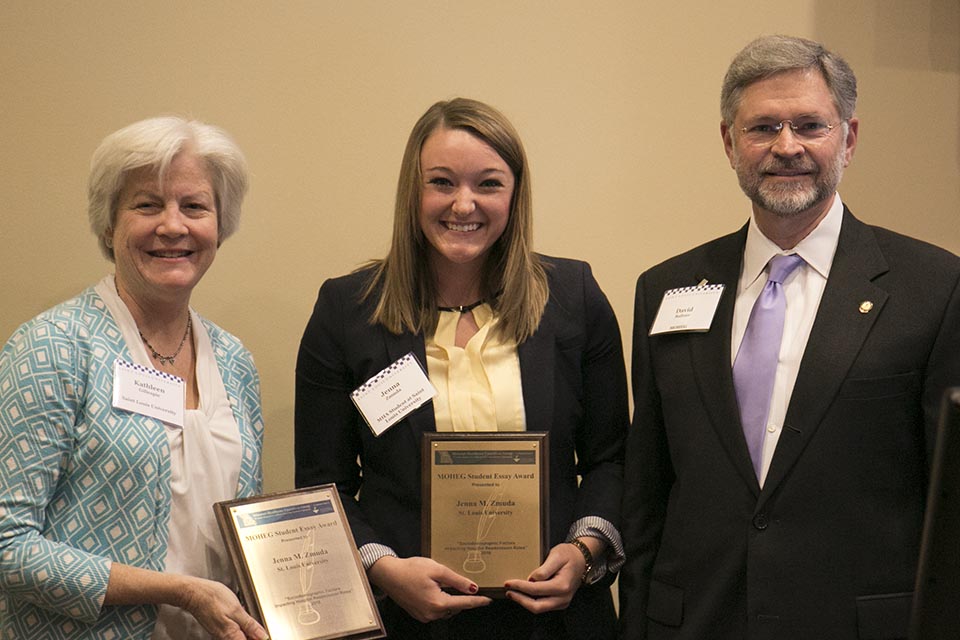A Winning Idea for Health Care
Poorer health outcomes and higher costs are linked to hospital readmissions, M.H.A. student Jenna Zmuda '18 finds in her award-winning essay.
Jenna Zmuda '18, a Master of Health Administration student at Saint Louis University's College for Public Health and Social Justice, was awarded $1,000 and a trip to one of Missouri's largest health care conferences for her winning essay in the Missouri Healthcare Executives Group (MOHEG) Student Essay Competition.
In "Sociodemographic Factors Impacting Hospital Readmission Rates," Zmuda discussed how social and economic conditions such as poverty and low access to primary care affect the likelihood that patients treated for acute conditions such as heart attack or pneumonia will have to return to the hospital for additional care.
“The costs of health care continue to go up, in part because more services are needed in the hospital for conditions that could easily have been treated or prevented in a primary care setting," says Zmuda.
For Medicare patients, these so-called readmissions also result in financial consequences for hospitals under the Hospital Readmission Reduction Program, which is part of the Affordable Care Act. "Policy makers are constantly looking for ways to increase quality of care while decreasing Medicare program spending," says Zmuda. Hospitals with high readmission rates can pay up to three percent of their Medicare charges in penalties.
Zmuda says safety net hospitals that treat low-income patients are paying these penalties disproportionately, pointing to calls from health care trade groups for the government to include sociodemographic factors when calculating penalties.
"We need to consider factors outside the hospital when looking at readmission rates," says Zmuda. "Hospitals are being penalized for factors they have don’t have much control over."
One solution is to take into account the proportion of patients who receive Supplemental Security Income through the Social Security Administration when setting readmission rate targets. "This has to go back to policymakers," says Zmuda.
The winning essay began as a policy brief in Zmuda's health policy class. "As I turned the brief into a paper for the MOHEG contest, I loved learning about how different factors outside the hospital impact overall health for everyone," says Zmuda. "It was interesting to look at a different aspect of health care, because my past internships have been in the area of quality and readmission rates do impact quality of care."
The student essay competition is open to students from all six accredited health administration programs in Missouri. MOHEG is the Missouri chapter of the American College of Healthcare Executives, an international professional organization for health administrators. Through its relationship with the Department of Health Management and Policy, it offers networking and educational opportunities for health administration students. Recently, MOHEG partnered with SLU to present the 2016 Mary Gumble Levy Lecture.
A first-year student, Zmuda originally had her eye on a career in consulting, but now sees herself in administration. "I want to stay in an organization for a good amount of time and see its improvement," she says.
"I would love to work in a pediatric hospital because I am interested in how you can impact the whole family. You want the experience to be good for them, beyond simply whether the patient gets better. Were the providers helpful? Was the family satisfied with their care? It's the big picture."
The Saint Louis University College for Public Health and Social Justice is the only academic unit of its kind among the nearly 250 Catholic institutions of higher education in the United States. With a focus on finding innovative and collaborative solutions for complex global health problems, the College offers nationally recognized programs in global public health, social work, health management and health policy, epidemiology, biostatistics, environmental and occupational health, behavioral science and health education, emergency management, biosecurity and disaster preparedness, and criminology and criminal justice.
###
Published: Dec. 13, 2016
CPHSJ Communications
